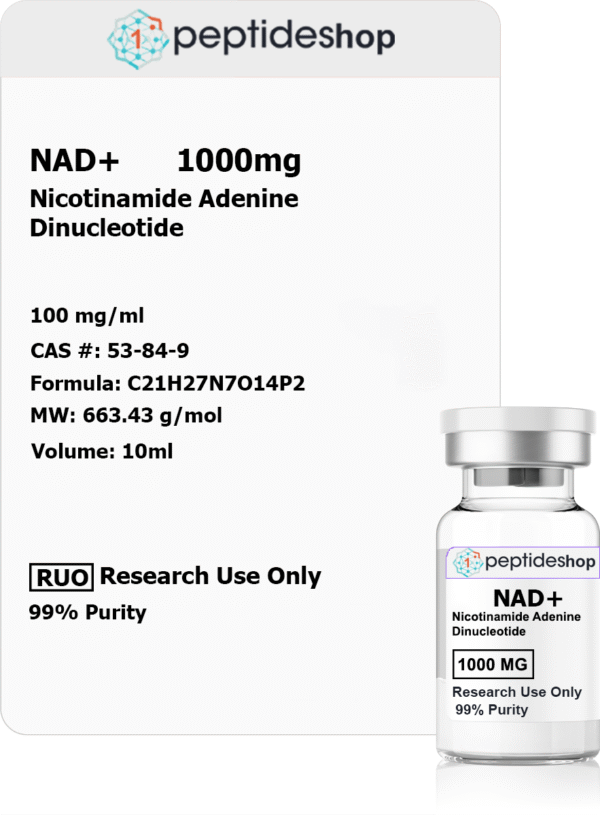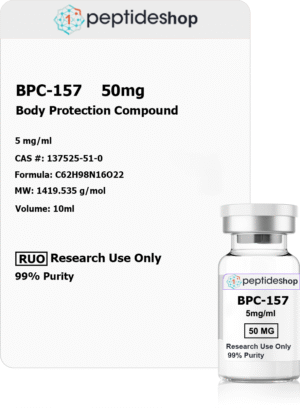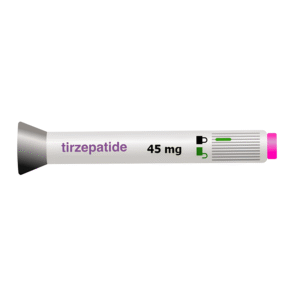NAD+ (1000mg)
Original price was: $150.00.$97.00Current price is: $97.00.
NAD+ (nicotinamide adenine dinucleotide) is a vital coenzyme in all living cells, essential for metabolic processes and cellular function. It acts as a mediator of redox reactions, alternating between its oxidized (NAD+) and reduced (NADH) forms to facilitate electron transfer, crucial for energy production and sustaining life. Involved in over 500 enzymatic reactions, NAD+ is central to maintaining cellular homeostasis. Research shows that NAD+ may be beneficial in improving muscle function, protecting cells of the nervous system, and generally reducing the effects of aging.
Beyond energy metabolism, NAD+ supports DNA repair and gene regulation through enzymes like sirtuins and PARPs. Sirtuins use NAD+ to regulate cellular functions such as DNA repair, gene expression, and aging, while PARPs utilize it to repair DNA damage and maintain genomic stability. These roles underscore NAD+’s importance in cellular integrity and combating aging.
Contents of the Package
- 1 x 10ml sterile multi-dose vial
- Active ingredient: NAD⁺ (Nicotinamide Adenine Dinucleotide) at 100mg/ml
- Clear, aqueous solution
- Preserved with bacteriostatic saline
- Packaged in tamper-evident USP-grade vial
- Designed for intramuscular injection only
About NAD+
NAD⁺ is a vital coenzyme found in all living cells, playing a central role in mitochondrial function, energy metabolism, DNA repair, and cellular signaling. It is an essential molecule in redox reactions, particularly in converting nutrients into cellular energy (ATP) via the Krebs cycle and oxidative phosphorylation.
NAD⁺ levels naturally decline with age, stress, toxin exposure, and chronic illness — contributing to mitochondrial dysfunction, fatigue, cognitive decline, and metabolic syndromes. Intramuscular NAD⁺ supplementation may help restore these levels, promoting systemic vitality and neuroprotection.
Mechanism of Action
NAD⁺ functions as a critical redox coenzyme, alternating between NAD⁺ and NADH to shuttle electrons during cellular respiration. It is essential for ATP production, cellular repair, and signaling.
Key pathways affected by NAD⁺ include:
- Mitochondrial function: Boosts oxidative phosphorylation and cellular energy
- Sirtuin activation: Supports anti-aging gene expression and DNA repair
- PARP activity: Promotes DNA damage response and genomic stability
- Neurotransmitter synthesis: Assists in dopamine, serotonin, and noradrenaline metabolism
- Detoxification: Assists liver in converting reactive oxygen species and toxins
By replenishing NAD⁺ levels, the body may restore metabolic efficiency, immune balance, and neurological resilience.
Adverse Reactions
NAD⁺ is typically well tolerated when administered properly, though injection technique and dosage are key to minimizing discomfort.
Potential side effects include:
- Localized muscle soreness or cramping (due to IM injection)
- Mild headache or flushing
- Fatigue or lethargy (typically short-lived)
- Nausea or lightheadedness during/after injection if pushed too rapidly
These effects are usually transient and may be reduced by slower administration and dose titration.
Benefits
Potential Benefits:
- Increased energy production and reduced fatigue
- Enhanced focus, mood, and cognitive performance
- Improved metabolic function and insulin sensitivity
- Cellular anti-aging and DNA repair support
- Detoxification and neuroprotective effects
- May aid in addiction recovery and withdrawal management
Side Effects
⚠️ Possible Side Effects:
- Injection site pain or muscle soreness
- Headache or flushing
- Temporary fatigue or lightheadedness
- Nausea if administered too quickly
- Rare: anxiety or restlessness in very sensitive individuals
Contraindications & Precautions
- Not recommended for individuals with known hypersensitivity to NAD⁺ or its precursors
- Use caution in individuals with hypotension, as NAD⁺ may mildly lower blood pressure
- Should be used carefully in those with severe hepatic or renal impairment
- NAD⁺ may interact with certain cancer therapies that rely on NAD⁺ depletion mechanisms
Always inject slowly and monitor for any signs of systemic discomfort, especially at higher doses.
Drug Interactions
There are no known severe drug interactions. However, consider the following:
- May enhance mitochondrial function, affecting drug metabolism
- Synergistic with sirtuin activators like resveratrol or pterostilbene
- May interact with chemotherapy agents targeting NAD⁺-dependent enzymes
- Compatible with:
- Vitamin B complex
- CoQ10
- Glutathione
- L-carnitine and other mitochondrial support compounds
Pregnancy & Breastfeeding
There is limited human safety data on NAD⁺ injections in pregnant or breastfeeding individuals. While NAD⁺ is a naturally occurring molecule, use during pregnancy or lactation is not currently recommended due to lack of conclusive data.
Children
NAD⁺ injections are not approved for pediatric use. While NAD⁺ is vital to metabolism in all age groups, supplementation should be reserved for adults unless prescribed by a pediatric specialist under clinical supervision.
FDA approval
NAD⁺ is not FDA-approved as a pharmaceutical drug for injectable use. It is available through compounding pharmacies and used in clinical wellness, addiction recovery, anti-aging, and functional medicine practices. FDA-approved uses of NAD precursors (e.g., niacinamide) exist, but injectable NAD⁺ is considered investigational.
References
- Rajman L, et al. (2018). “NAD⁺ as a metabolic and signaling molecule in aging and disease.” Cell Metabolism.
- Trammell SA, et al. (2016). “Pharmacokinetics of NAD⁺ precursors in humans.” Nature Communications.
- Ying W. (2008). “NAD⁺ and NADH in cellular functions and neurodegeneration.” Antioxidants & Redox Signaling.
- Grant R, et al. (2019). “NAD⁺ replenishment improves mitochondrial function in patients with chronic fatigue.” Mitochondrion.
- Liu L, et al. (2017). “NAD⁺ metabolism and its roles in cellular repair.” Annual Review of Biochemistry.





